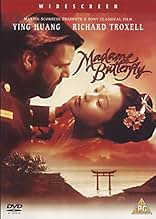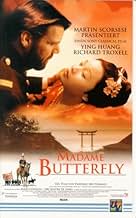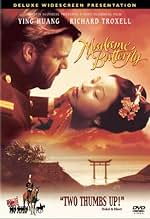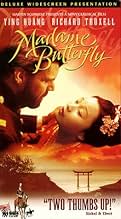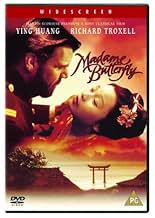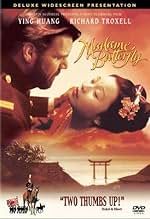Aggiungi una trama nella tua linguaThe story of a young geisha who falls madly in love with an american captain that travels all around the world collecting hearts.The story of a young geisha who falls madly in love with an american captain that travels all around the world collecting hearts.The story of a young geisha who falls madly in love with an american captain that travels all around the world collecting hearts.
- Regia
- Sceneggiatura
- Star
- Premi
- 1 vittoria e 1 candidatura in totale
Recensioni in evidenza
The first time I saw Madama Butterfly was early August 2020, as a 2017 performance at the Royal Opera House. I loved the music so much I decided to watch this version as well. This movie has taken a realist approach to depicting the story by Asian singers for the Asian roles. This choice was slightly at the cost of operatic quality, but if for the sake for top-notch voices the cast had been whitewashed and replaced by singers twice as old, I would have skipped it. This is a movie, not a live performance.
Ying Huang (Cio-cio-san/Butterfly) played the affection-starved yet goodhearted woman beautifully, if not a little stiffly at times. Richard Troxell (Pinkerton, the American naval officer) played the entitled "playboy" so convincingly I had the urge to slap him through the screen. Jingma Fan (Goro) played the marriage broker; in this version he's not only oppertunistic but also slightly malicious which was surprising but Fan played it well.
The visuals in this movie were unexpectedly beautiful. Instead of depicting the bustling harbour city of Nagasaki they chose a more rural setting with thatched houses; as it was shot in Tunisia the village is dotted with olive trees rather than pine trees. This was probably done for economic reasons, yet it never feels fake: the houses look real and lively, the gardens are lined with flowers, people are fishing for mussels in the surf. The costumes and interiors were pretty as well.
However, I think the director took too many artistic liberties. By inserting flashbacks and flash-forwards and making it appear as if days or even weeks pass between different events he interrupted the pacing of the music. He also left out about 10 minutes of music at the beginning of Act 3 ("Oh Eh ! Oh Eh !") The cinematography was pretty during shots of landscapes and outside scenes, but during interior scenes the mostly static shots tended to make the rooms look cramped.
Despite good singers and beautiful set design, its shortcomings on both the cinematic and operatic side make this film fall short of being great. However, it is still good and I can recommend this to everyone.
Ying Huang (Cio-cio-san/Butterfly) played the affection-starved yet goodhearted woman beautifully, if not a little stiffly at times. Richard Troxell (Pinkerton, the American naval officer) played the entitled "playboy" so convincingly I had the urge to slap him through the screen. Jingma Fan (Goro) played the marriage broker; in this version he's not only oppertunistic but also slightly malicious which was surprising but Fan played it well.
The visuals in this movie were unexpectedly beautiful. Instead of depicting the bustling harbour city of Nagasaki they chose a more rural setting with thatched houses; as it was shot in Tunisia the village is dotted with olive trees rather than pine trees. This was probably done for economic reasons, yet it never feels fake: the houses look real and lively, the gardens are lined with flowers, people are fishing for mussels in the surf. The costumes and interiors were pretty as well.
However, I think the director took too many artistic liberties. By inserting flashbacks and flash-forwards and making it appear as if days or even weeks pass between different events he interrupted the pacing of the music. He also left out about 10 minutes of music at the beginning of Act 3 ("Oh Eh ! Oh Eh !") The cinematography was pretty during shots of landscapes and outside scenes, but during interior scenes the mostly static shots tended to make the rooms look cramped.
Despite good singers and beautiful set design, its shortcomings on both the cinematic and operatic side make this film fall short of being great. However, it is still good and I can recommend this to everyone.
Madame Butterfly is a beautiful, romantic and dramatic story. It is all about a fifteen years old geisha called Cio Cio-San, who gets married with the official of the American navy, Benjamim Franklin Pinkerton.
Pinkerton, the fiancé, is just buying a woman, as he did in other parts of the world, to be close in his moments of loneliness, while he doesn't marry a true American wife.
After three years of marriage, Pinkerton goes back to the United States, leaving Butterfly with a small son he never knew. Cio Cio San believes that her husband will return, and she refuses to assume her Japanese values and a new life.
During all the story, Cio Cio-San will always count with the unconditional friendship of the maid Suzuki.
To get things worst, Butterfly receives a letter of Pinkerton informing that he will not return anymore, making clear that he married an American woman. Butterfly interprets his words in an erroneous way, and she sees new hopes for of her husband arrival.
He returns, however, to look for his son.
The end of the plot shows the suicide of Butterfly, when noticing that she had lost everything that she loved, the husband and now also the son. (She had used as a weapon her father's sword, with the inscription: "To die with honor, when one can no longer live with honor". The now-humiliated, heartbroken daughter of a disgraced samurai, she dies proudly - as a samurai.)
The opera is tragic, because Cio Cio-San really believes in her illusions, and she only notices the mistakes very late.
There are difficulties, for example, how she was renounced by her relatives by converting Pinkerton's religion (Catholicism), or her son, that came to this world, only after the American had already left.
The history is full of cultural contrasts, since the story is in the Japan of the beginning of XX century, where the prejudices were worst.
The reason whyI liked this movie so much : in my opinion, it is the best Madame Butterfly I have ever seen in a movie. I was surprised to see that the movie is all sang in opera terms. Many people might not like that.
The sets are beautiful, and the movie was made full of details, to really show the Japanese habits, thoughts and life style.
Frédéric Mitterrand had even the concern of choosing Asian actors to play in the cast, much better then Jean Pierre-Ponnele's version, where all of the actors are westerns.
Pinkerton, the fiancé, is just buying a woman, as he did in other parts of the world, to be close in his moments of loneliness, while he doesn't marry a true American wife.
After three years of marriage, Pinkerton goes back to the United States, leaving Butterfly with a small son he never knew. Cio Cio San believes that her husband will return, and she refuses to assume her Japanese values and a new life.
During all the story, Cio Cio-San will always count with the unconditional friendship of the maid Suzuki.
To get things worst, Butterfly receives a letter of Pinkerton informing that he will not return anymore, making clear that he married an American woman. Butterfly interprets his words in an erroneous way, and she sees new hopes for of her husband arrival.
He returns, however, to look for his son.
The end of the plot shows the suicide of Butterfly, when noticing that she had lost everything that she loved, the husband and now also the son. (She had used as a weapon her father's sword, with the inscription: "To die with honor, when one can no longer live with honor". The now-humiliated, heartbroken daughter of a disgraced samurai, she dies proudly - as a samurai.)
The opera is tragic, because Cio Cio-San really believes in her illusions, and she only notices the mistakes very late.
There are difficulties, for example, how she was renounced by her relatives by converting Pinkerton's religion (Catholicism), or her son, that came to this world, only after the American had already left.
The history is full of cultural contrasts, since the story is in the Japan of the beginning of XX century, where the prejudices were worst.
The reason whyI liked this movie so much : in my opinion, it is the best Madame Butterfly I have ever seen in a movie. I was surprised to see that the movie is all sang in opera terms. Many people might not like that.
The sets are beautiful, and the movie was made full of details, to really show the Japanese habits, thoughts and life style.
Frédéric Mitterrand had even the concern of choosing Asian actors to play in the cast, much better then Jean Pierre-Ponnele's version, where all of the actors are westerns.
Unfortunatly , their lips aren't moving right. So their either lip synching or it's been dubbed. Richard Troxell's the best in this. His emotion drips off the screen. So's his cohort. The actress playing butterfly looks and acts too old for the part. I personally loved this film. But as they are singing in opera terms, many might not appreciate it. It's up to you. (example: I found it to be uplifting and another person found it to be more depressing than The Refelecting Skin.) So what you take from it is entirely up to you. :)
9/10 (can't give it a full 10 because of the dubbing/lip synch problems.
Quality: 9/10 Entertainment: 10/10 (how can you not. with such powerful singing) Replayable: 6/10
9/10 (can't give it a full 10 because of the dubbing/lip synch problems.
Quality: 9/10 Entertainment: 10/10 (how can you not. with such powerful singing) Replayable: 6/10
This really is a great opera movie. All the actors have the right age and -when it comes to appearance- the right "beauty". Butterfly is a young girl in the story, and in this movie she looks as one (and she is only in her early twenties). Nevertheless she does all the singing herself. She has won prizes in opera competitions and is very convincing. She is from China, not Japan, and has the perfect voice for the part. Who would ever find this story believable with a 40-years old soprano? Now with this young Asian actress/singer one is moved as one should be. Not only the singing, but also the emotions are clear and real. This could never be achieved in play-back from a different singer. All the other main characters are (very) good actors and sing their own parts (very well). The setting is beautiful, though not in Japan, but in Tunisia (I read afterwards). The orchestra plays well (under James Conlon). In fact everything is good. Only a few minor parts are sung by different persons than the (Asian) actors. Summarizing: The best Butterfly I have ever seen and probably the best I will ever see from now on.
I love Madame Butterfly so naturally I wanted to see this 1995 film. And I am so glad I saw it, as it is a beautiful and excellent film of a wonderful opera. At hindsight, the opera's story is rather implausible, however the love story and telling of it is timeless, Cio Cio San is a charming lead character and the music(my favourites being Humming Chorus, Flower Duet, Un Bel Di Vedremo and particularly the act 1 love duet) is among Puccini's very finest.
There are only two things I wasn't crazy about here. One was showing the Gonze as a supernatural figure and floating in mid air, I personally found it unnecessary and felt it distracted from the drama of that particular moment. The other was the use of black and white footage of old Japan. In a way it was interesting, but I for one wasn't entirely sure whether it fitted with the scene(Humming Chorus in this case).
However, this film is visually stunning, with sweeping camera shots, stunning scenery and evocative costumes. The beautiful music is beautifully performed by the orchestra and is conducted with precision and sensitivity. When it comes to the acting/staging, the love duet was genuinely affecting and the Flower Duet blended and acted beguilingly, but the revelations were Un Bel Di Vedremo and the final scene, both of which moved me to tears.
The acting and singing work hugely too. Ying Huang amazed me with her beauty and appealing voice, and Richard Troxell is an excellent Pinkerton, never trying too hard to make us hate him. Ning Liang is one of the most sympathetic Suzukis I know of, and Sharpless shapes his music beautifully. Goro also is more cynical and less bumbling, something that I loved and found refreshing.
Overall, excellent film and one where a box of tissues by your side is necessary. 8/10 Bethany Cox
There are only two things I wasn't crazy about here. One was showing the Gonze as a supernatural figure and floating in mid air, I personally found it unnecessary and felt it distracted from the drama of that particular moment. The other was the use of black and white footage of old Japan. In a way it was interesting, but I for one wasn't entirely sure whether it fitted with the scene(Humming Chorus in this case).
However, this film is visually stunning, with sweeping camera shots, stunning scenery and evocative costumes. The beautiful music is beautifully performed by the orchestra and is conducted with precision and sensitivity. When it comes to the acting/staging, the love duet was genuinely affecting and the Flower Duet blended and acted beguilingly, but the revelations were Un Bel Di Vedremo and the final scene, both of which moved me to tears.
The acting and singing work hugely too. Ying Huang amazed me with her beauty and appealing voice, and Richard Troxell is an excellent Pinkerton, never trying too hard to make us hate him. Ning Liang is one of the most sympathetic Suzukis I know of, and Sharpless shapes his music beautifully. Goro also is more cynical and less bumbling, something that I loved and found refreshing.
Overall, excellent film and one where a box of tissues by your side is necessary. 8/10 Bethany Cox
Lo sapevi?
- QuizThe entire Japanese village set and house were built in Tunisia, Northern Africa.
- BlooperDuring Act 2 and Act 3, a blooming wisteria is shown to be growing along the house's roof above the porch. In reality wisteria would not have been grown here as the house's structure would have been unsuitable for it. Wisteria is a plant known to become heavy and massive with age; it would have been grown along a sturdy trellis or stone wall instead as not to cause any damage.
- Citazioni
Lieutenant Benjamin Franklin Pinkerton: She's like a porcelain doll. She sets me on fire.
I più visti
Accedi per valutare e creare un elenco di titoli salvati per ottenere consigli personalizzati
- How long is Madame Butterfly?Powered by Alexa
Dettagli
- Data di uscita
- Paesi di origine
- Lingua
- Celebre anche come
- Madame Butterfly, de Frederick Mitterand
- Luoghi delle riprese
- Aziende produttrici
- Vedi altri crediti dell’azienda su IMDbPro
Botteghino
- Lordo Stati Uniti e Canada
- 65.196 USD
- Fine settimana di apertura Stati Uniti e Canada
- 6027 USD
- 5 mag 1996
- Lordo in tutto il mondo
- 65.196 USD
Contribuisci a questa pagina
Suggerisci una modifica o aggiungi i contenuti mancanti

